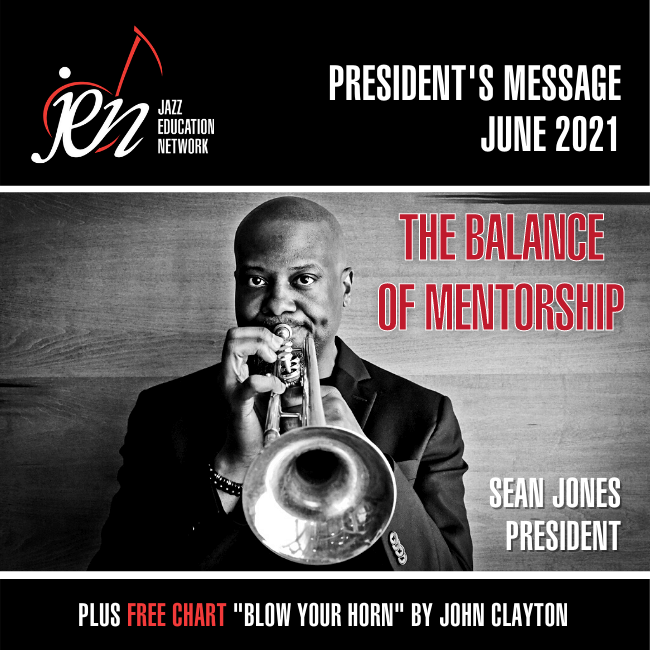
Greetings everyone. I’m Sean Jones, the President of the Jazz Education Network, and this is my June message.
I’ve been thinking a lot about mentoring as of late. And I’ve been fortunate in that I’ve been working with organizations like Carnegie hall, and I’ve had the opportunity to teach at schools like the Berklee College of Music, and now at the Peabody Conservatory of Music and Dance.
But I often think about the students that are in the masterclasses when I travel around the world, and those places where the music isn’t necessarily readily accessible to them. Or I think about students like me, frankly, that come from Warren, Ohio. There’s no performing arts high school there. I just was fortunate enough to have really good band directors who noticed me in the back of the classroom, kind of checking things out, taking a little extra time, playing and practicing. I appreciate those teachers for that because they saw me in moments of fatigue. They saw me in moments where I’m sure they wanted to throw their hands up in the air and just simply walk out of the room. They took extra time with me.
That’s great mentorship.
I want to speak about a little bit of a deeper level of mentorship here. I want all of the educators that are here listening to this, or wherever you are listening to this, to think about the students who are left behind. Think about the students that aren’t showing up for class. Think about the students who never have their work done on time.
Think about the students who have natural abilities, but just seem (keyword being seem) to not want to dive into theory or get into piano or get into arranging or a myriad of things that they seem to resist.
In my experience that hesitation in that resistance comes from fear. That hesitation and resistance comes from a deep level of angst that they may be feeling like they might not feel like they belong. There might be something going on at home and it could be anything.
Right now I would encourage us as educators to tap into that deeper level of mentorship. When the students aren’t showing up, call them–incessantly. When the students aren’t doing the work, hound them, say “Hey”. I’m not talking about demonizing them. I’m saying, “what’s going on?” Spend the extra time to figure out what’s happening in their lives. Figure out why. There’s always a why.
A lot of times we discredit and we just write off the students that don’t seem that they’re going to get it, or they’re having trouble, because there are so many students that are doing well. Well, I want to remind everyone that the scene is broad, it’s wide. For just as many of those folks that don’t get it right away, or don’t have the resources to get it. There are so many students that are struggling, that are left behind. And oftentimes it’s because we spend more time with the folks that can get it and not enough time with the folks that are having trouble.
So I want to encourage all of you, my fellow educators, to tap into that deeper part of yourself,
that deeper part of your intuition and that caring teacher that I know that you all are, and spend more time with those folks, those folks that need you the most, which are the folks that get left behind.
Thank you so much for checking us out.
Much love,
– Sean Jones